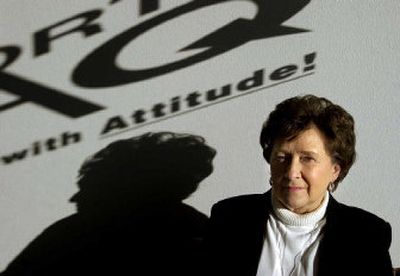Holding the bag

Terrible.
In a word, that’s been the year for Lola Emter.
For the past 11 months her company, Courtside Products Inc., has been unable to shake the stigma of being caught up in a federal stock fraud investigation that earned national notoriety.
The episode has cost her tiny Spokane Valley company, which makes athletic bags marketed under the name “SportSaq,” as much as $1 million.
It all began as an honest attempt to raise money – money to hire more salespeople and award management for years of risk and hard work. Instead it ended up a botched – and perhaps illegal – stock scam that remains under investigation by the Federal Bureau of Investigation.
In late January, the U.S. Securities & Exchange Commission initiated a crackdown on “pump-and-dump” schemes that had grown so prevalent among small companies making an initial public offering of stock.
Stock promoters send mass e-mails that excitedly tout the company’s shares, attempting to drive up the price of its stock. As price peaks, these promoters and the people they work for dump their shares.
“I didn’t know that much about public companies when I got into this thing,” Emter said recently, “but believe me, now I’ve learned plenty.”
Emter is an unassuming person who got into this business to aid her son, Curt Medlen.
She has sunk her retirement — even a second mortgage on her home — into the business.
Her exit strategy was the IPO of Courtside. But instead of a $3 million cash infusion, the deal turned disastrous. Emter hired a financial advisor to help the company raise cash. The advisor’s recommendation was to turn Courtside into a penny-stock firm traded on the pink sheets.
The decision ultimately led to the hiring of a Phoenix, Ariz. stock promoter named Michael Paloma, who, unbeknownst to Emter, had a checkered history in the securities business.
Paloma was given 7.5 percent of Courtside’s stock as part of his promoter deal.
Within days, spam e-mails hyping Courtside as a surefire moneymaker were sent by the thousands.
One e-mail message claimed Courtside was “one of the most amazing opportunities ever!”
Emter was appalled with the campaign, and she wasn’t the only one.
Many people who received the spam sent angrily worded faxes, e-mails and phone calls. Some contacted the SEC, which suspended trading in Courtside stock – but not until the Courtside shares awarded to Paloma’s firm had been pumped to high prices, and then dumped amid heavy trading.
In the end, Emter figures whoever was behind the pump-and-dump scheme (no one has been charged) may have collected as much as $4 million. Courtside collected about $75,000.
Though the trading suspension was lifted after 10 days, the damage was done. Emter has been unable to find a legitimate market maker for Courtside, effectively keeping the company’s shares from trading and thus starving the company of the money it had hoped to raise through the issuance of stock. Emter had hoped to use that money to enlarge Courtside’s sales force and repay managers.
Today Emter sighs when she recounts the past year.
“It has been very difficult,” she said.
Sales are average and Courtside’s best opportunity now may be to find a private investor or perhaps merge with a larger firm.
An attorney hired by her firm did not return phone messages.
“We tried to do something with this company,” she said. “It’s been a struggle.”